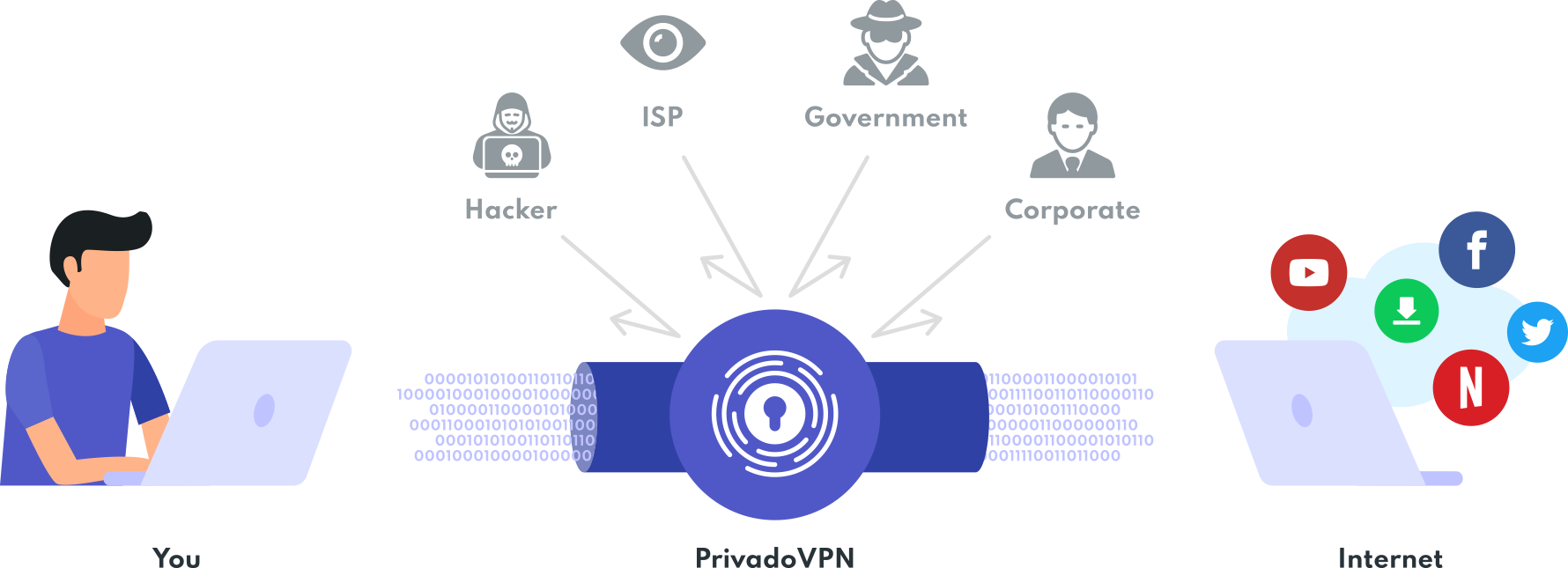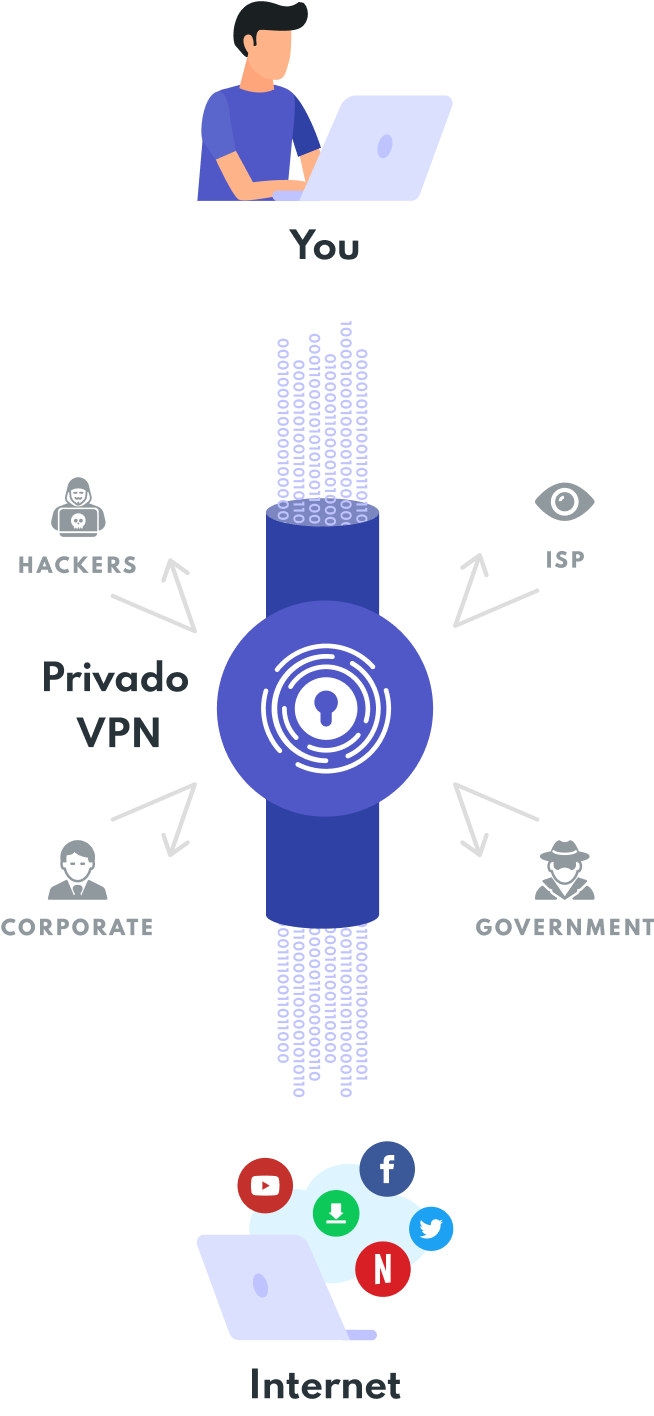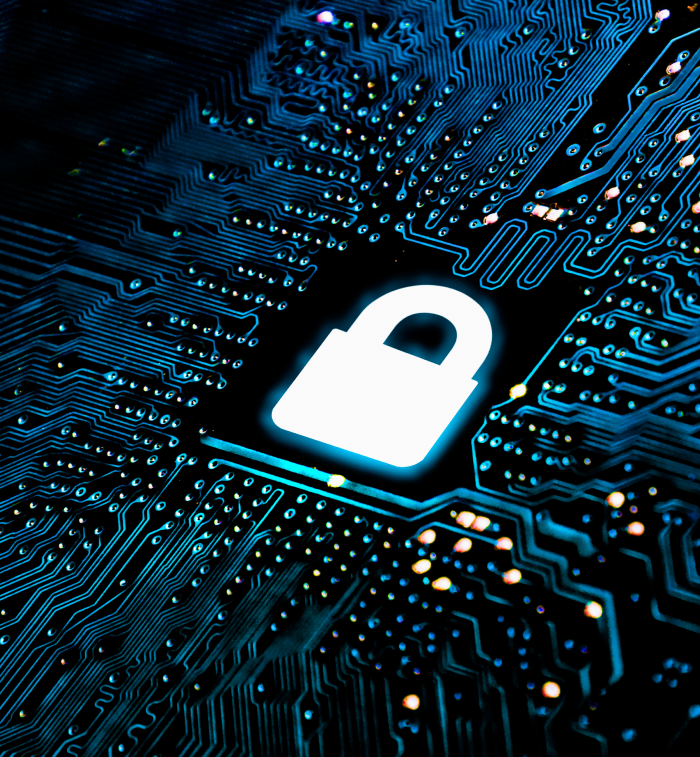The Latest in Online Encryption
Use the Most Trusted VPN Protocols on the Planet
Get PrivadoVPNSet Up Your No-Log VPN for Free in 3 Simple Steps
It's easy to get the best zero log VPN and enjoy the best online security.
Protect up to 10 devices simultaneously.
How Does a VPN Protocol Work?


We could get into a lot of detail about the workings and history of VPN protocols (in fact, we did), but there are three things you really need to know about how a VPN can encrypt your data.
- A VPN Encryption Protocol tells computers how they should interact with data and a server in order to use the VPN.
- Different VPN protocols handle data differently, and allow you to balance transfer speed with security via encryption to meet your needs.
- PrivadoVPN only uses the best, time-tested VPN encryption protocols to make sure that your security isn't compromised by buggy, new software.
Customize Your Encryption
Not every VPN Encryption Protocol is for every user, which is why PrivadoVPN lets you choose which VPN protocol to use from the most proven options in existence. We also have our technical team constantly looking for new cipher and algorithm options that show the same high level of encryption security and functionality as what is currently available on our service.
What this means is that you have the ability to change your VPN settings to match your Internet usage style. Play a lot of games or watch a lot of media? You might want a protocol that is safe, but prioritizes speed. Downloading large files? Pick a VPN protocol that is more secure so that you not only protect your network from spying, but also ensure that the files come through uncorrupted.
Everybody uses the Internet differently. Shouldn't your VPN recognize that?
Why The Encryption that Comes from a VPN Is Good Security Hygiene

All of Your VPN Data is Encrypted
Hide Your IP Address
Potentially Increase Your Download Speed
What's the Difference Between Various Encryption Protocols?
There are several encryption protocols that a VPN can use to protect your network. The fact of the matter is there's no straightforward security method to mix data up and put it back together. Each encryption protocol on a VPN uses a specific algorithm to find the right balance between server speed and Internet security.
OpenVPN
This is the strongest encryption protocol regarding security of any in existence. It is also the slowest because it checks every byte that is transmitted to make sure it's correct. However, it is still popular among VPNs because of the security benefits.
IKEv2
This VPN protocol is built for speed. Instead of checking the network transfer while it's going on, it sends a list with the public key that can be verified when the server has the full file. It has slightly less robust security than OpenVPN, but is still a great VPN protocol.
WireGuard®
WireGuard® is a fairly new, but thoroughly tested, VPN protocol that balances speed and security for the best of both worlds. It uses AES encryption to build a key and a hybrid approach to data handling between OpenVPN and IKEv2, resulting in a more secure, faster connection.
Frequently Asked Questions
How do VPNs protect me online?
There are two critical ways that a VPN guards your private information and improves your online security.
- First, connecting to VPN servers masks your IP address for better privacy. That means that the personal information normally indicated by that number is hidden behind those VPN servers.
- Secondly, a VPN encrypts your data. PrivadoVPN uses 256-bit-AES encryption, which means that your data is systematically scrambled before it leaves your computer. That information then travels through an encrypted tunnel, through the VPN, to the destination computer. Only when the transfer is complete will a "private key" be used to unscramble the files into usable information.
The world's fastest computer would take 27,337,893,038,406,611,194,430,009,974,922,940,323,611,067,429,756,962,487 years to break 256-bit encryption by brute force. Put another way: 27,337,893 trillion trillion trillion trillion years. This is the best form of encryption on the planet and the gold-standard for online security.
Why is it important to encrypt your connection with a VPN?
Without high quality encryption, your connection just isn't secure. Good Internet security requires a VPN that can both hide and guard your data.
First of all, without a VPN, anybody can watch what you do online. In fact, somebody stalking a server probably has several times and you had no idea. Encryption makes that activity impenetrable.
Secondly, a VPN often has better encryption options than other protective measures. A VPN server is made with security in mind, so it will be able to employ better encryption than your personal system.
How does a VPN use encryption to protect me?
Your Internet connection is less like a tube and more like a road (or "superhighway" as people used to say in the 90s). Your information essentially travels out in the "open," like a car. And like a car, people who are watching the road can see inside and get access to that data, putting your security at risk.
A VPN is like building a secure tunnel around your data car. Before the data goes anywhere, it creates a wall of encryption using a combination of a public and private key that maintains your privacy by keeping anyone watching from being able to see it.
Moreover, a VPN hides your identity while you're online by hiding your real IP, which is the unique number every Internet-connected device is assigned to facilitate data transfer. In reality, the only true connection your computer makes is to the VPN server. After that, your VPN requests all the data you want and then passes it back to your computer, so requests come from the VPN and your privacy remains secure.
What is AES Encryption?
Advanced Encryption Standard (AES) is a block cipher used for encryption. It's so strong that the US government uses AES to encrypt classified documents as they travel from server to server.
But AES is for more than just transfers on a government network. In fact, using it for VPN security has helped us provide unbreakable encryption options. Using AES makes your computer and connection more secure.
It works by generating a public key and a private key based on the level of encryption your VPN is using. A "key" is a string of anywhere from 128 to 256 characters that acts as the code for how to rearrange your data.
When your VPN makes a connection to another server, it will send over its public key and receive a public key. Those keys will be used to make what's called a "session key," which is unique to every server-to-server connection and is an agreed upon way that the encryption will work.
At that point, the AES generated private key is used to decrypt all of that information into useful files.
AES encryption on PrivadoVPN is as secure as it can possibly get because our VPN protocols put the plaintext data through 14 rounds of scrambling. Only with the private key can anyone read any of the files that our VPN converts into ciphertext with AES encryption.
What is the best free VPN with advanced encryption?
I don't think you'll be surprised to learn that we think the best VPN that is both free and keeps zero logs is PrivadoVPN. Here's why:
- You get 10 GB of data for free every month. That's up to 5 times more than almost every VPN on the market. Your privacy is safer, longer.
- Users can access VPN servers from around the world, so it's possible to set your location for the fastest possible speed and best security/privacy.
- You'll be able to stream high quality content and use download services with a free VPN account.
- Because we are committed to our users' privacy, PrivadoVPN doesn't ask for anything other than a verified email to sign up for VPN service.
PrivadoVPN Offers All of These Amazing Features
Protect Up to 10 Devices With One Account
Now you can protect up to 10 Internet connected devices with a single PrivadoVPN Premium account. You no longer need to worry about whether to activate your VPN on your Mac laptop or your smartphone, you can protect them both, as well as the phones, tablets, and media devices of the rest of your family.
That means everybody can enjoy the security of a VPN with a hidden IP address and 256-bit encryption wherever they are.
Computers
Protect all your desktops and laptops from spying and anonymize your online activity on multiple simultaneous connections at home or out and about with the PrivadoVPN app.
Mobile Devices
On a phone or a tablet, you can make sure that everything you send and receive on it is encrypted, sent through a secure tunnel, and routed through our extensive network of global servers.
Online Entertainment Services
Whether you're watching on an Internet-ready TV or using an add-on device, you can ensure you're getting private Internet access and safe connections with PrivadoVPN.
Routers
You don't have to choose what devices to protect while you're at home. Install PrivadoVPN on your router and protect multiple devices connected to your network.
Pick a Plan to Protect All Devices
- Unlimited Data
- Servers in Cities
- 10 Connections
- Streaming Support
- Ad Blocker
- Unlimited Devices
- Zero-Log
- Threat Prevention
- Parental Controls
- Apps for:
- Unlimited Data
- Servers in Cities
- 10 Connections
- Streaming Support
- Ad Blocker
- Unlimited Devices
- Zero-Log
- Threat Prevention
- Parental Controls
- Apps for:
- Unlimited Data
- Servers in Cities
- 10 Connections
- Streaming Support
- Ad Blocker
- Unlimited Devices
- Zero-Log
- Threat Prevention
- Parental Controls
- Apps for: